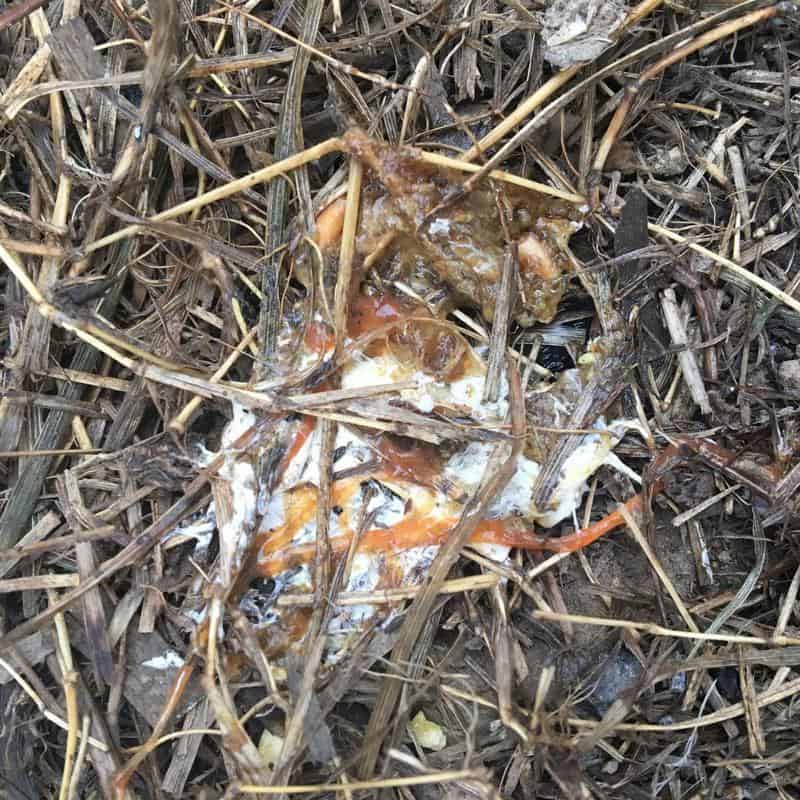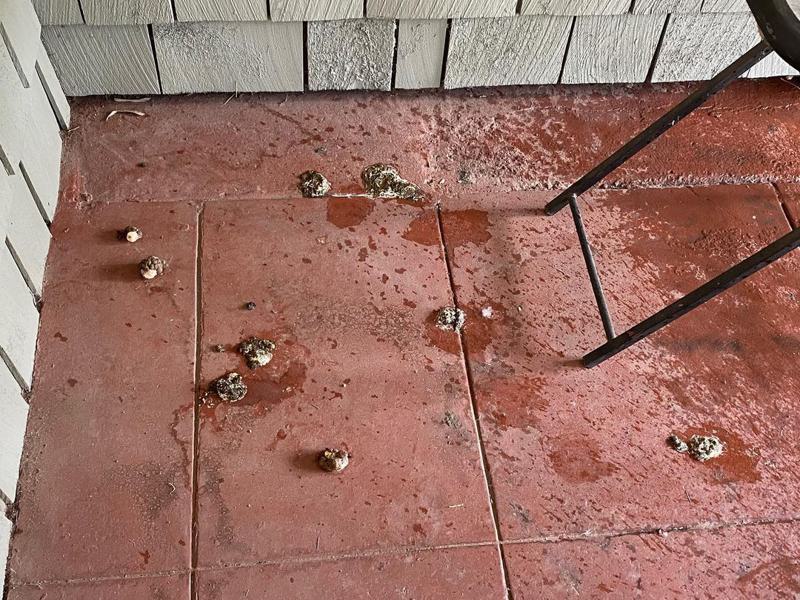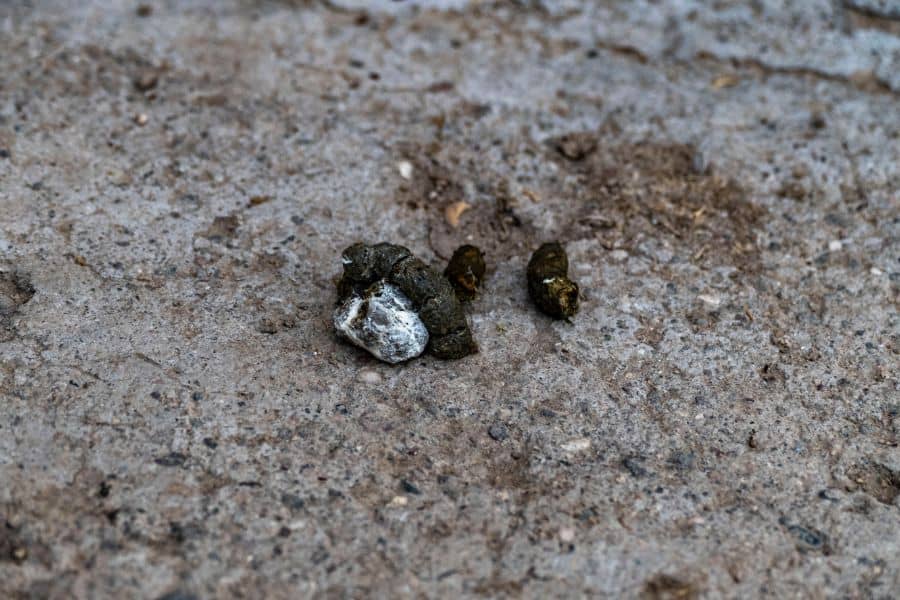For people who keep chickens, there’s a lot to learn, and if you decide to start a flock of your own, among other things, you’ll need to become an expert on chicken poop.
Keeping an eye on your chickens’ feces can tell you a lot about their health – and to help you diagnose any problems when things go wrong, in this post, we have all the info you need to know about chicken diarrhea.
What Does Normal Chicken Poop Look Like?
Before we think about diarrhea in chickens, we need to talk about what regular chicken poop looks like – because this will help us identify when there is a problem.
While chicken poop can vary in quantity, consistency and color (more about what the color can tell you a bit later), generally speaking, healthy chicken poop consists of small, brown, relatively solid globs with a white “cap”.
The white cap is urate, and this comes from the fact that chickens don’t urinate. Instead, they pass urates with their feces, and this shows up as a white cap in their droppings.
Sometimes, chickens will also pass what’s known as cecal droppings. These may be runnier than regular droppings and often smell quite nasty. However, they’re considered normal and nothing to worry about.
What Does Chicken Diarrhea Look Like?

Having talked about what normal, healthy chicken poop looks like, now we need to think about what diarrhea in chickens looks like – and usually, it should be easy to spot.
Chicken diarrhea is loose and watery – often, it looks a lot like dirty brown or white water. In addition, chicken diarrhea also tends to smell very bad, so if you find foul-smelling dirty water in your chicken coop or run, there’s a good chance that one of your birds has diarrhea.
However, one loose stool is nothing to worry about – diarrhea is defined as three watery stools like this in a day.
This means if one of your chickens does a runny poop, all you need to do is keep an eye on it – but if it continues, you need to identify the problem and take the appropriate action.
What Can Cause Diarrhea in Chickens?
There are many causes of diarrhea in chickens, and here are some of the most common.
Overeating Certain Foods
One of the most common – and least serious – causes of diarrhea in chickens is a change in their diets, and if you give them too much of certain treats, it can lead to loose stools for a few days.
For example, acidic fruits like blackberries or watery foods such as watermelon may cause them to have runny poops for a day or two. However, this problem will quickly resolve itself without any help from you.
Heat
In hot weather, chickens tend to eat less and drink more, and this increased intake of fluids can leave their stools looser than usual.
Again, this is nothing to worry too much about – just make sure they have plenty of clean water to drink and try to help them stay cool as much as possible.
Stress
If a chicken is stressed, perhaps due to the presence of a predator or the introduction of new birds to the flock, it can cause diarrhea.
If a new hen is causing the stress, the problem will resolve itself as the birds become accustomed to one another – but stress from external factors such as predators will need to be dealt with before the chickens feel safe again.
Antibiotics
If your chickens are on a course of antibiotics, it may upset their digestive systems temporarily, but this should soon pass once the treatment is complete.
If chickens are on more long-term regimes of antibiotics, the problem won’t go away – but chickens shouldn’t take “preventative” courses of antibiotics, and if yours are being given antibiotics all the time to prevent potential illness, this practice should be stopped.
Worms
If your birds contract intestinal parasites, it may also cause diarrhea, and if this happens, you will need to deworm your whole flock.
Worms may sometimes be diagnosed by blood in the stools, and you may even be able to spot the worms in your chickens’ poop.
Bad or Dirty Feed or Water
If you don’t keep your chicken’s feed or water clean, it can cause diarrhea. Don’t leave food sitting in their runs for too long. Instead, you should remove old food and replace it daily, or you should use an automatic dispenser to make sure they don’t poop in their own food.
The same is true of water. Make sure you change it often or use an automatic water dispenser.
Keeping their food and water clean is especially important in summer since it can go bad and make them ill even faster.
During the hottest parts of the year, consider changing food and water twice a day.
Dead Animals in Their Coop or Run
If a mouse or other similar pest gets into a chicken coop and then dies there, it can make your birds sick very quickly.
As a result, it’s important to keep your coop clean to make sure nothing like this can happen – and also try to prevent unwelcome visitors from gaining access to the coop in the first place.
Coccidiosis
Coccidiosis is a disease that can occur through poor hygiene – it is caused by the coccidian protozoa, a type of parasite that infects the intestinal tract.
Once one of your birds catches it, it can quickly spread to the rest of your flock through their feces, so you need to act quickly to stop an outbreak.
As well as diarrhea, which may contain blood, infected chickens will seem lethargic, have ruffled feathers and generally look as though they’re feeling sorry for themselves.
Chicken Cholera
Chickens with diarrhea, trouble breathing, loss of appetite and blue combs or wattles may be suffering from cholera. Chickens may suffer from chronic cholera, but they may also die suddenly from it.
There’s no cure, so you should ensure your chickens are fully vaccinated, and you should also make sure their coop and run are kept clean at all times.
Virulent Newcastle Disease (VND)
A very serious condition that chickens can contract is VND, and one symptom is green watery diarrhea.
If your chickens experience an outbreak, around 30-80% may die, and since there is no cure, all infected birds must be destroyed.
The best defense against this disease is good hygiene coupled with vaccination – and early diagnosis may help to save as many of your birds as possible.
Other symptoms to look out for include swellings around the eyes and neck, gasping or coughing, muscular tremors, drooping wings, twisting of the neck, paralysis, misshapen eggs, eggs with rough or thin shells and reduced egg-laying productivity.
In severe cases, sudden death is also possible.
Infectious Bursal Disease
Another extremely serious and highly contagious condition is infectious bursal disease, also known as gumboro disease.
To identify this, look out for yellowish diarrhea or yellow and foamy stools – other symptoms include pecking at other chickens, lethargy, ruffled feathers, trembling, slow walking, reduced appetite and difficulty passing stools.
Chickens can be vaccinated against this disease when young.
Diagnosing Chicken Illnesses
If you notice that one or more of your chickens have diarrhea – and it’s more than just a one-off occurrence – before you can treat the diarrhea, you first need to work out what has caused it.
Start by thinking about whether it could be diet- or stress-related – or if your chickens are on a course of antibiotics, this could also be another obvious cause.
Check for signs of worms, and make sure their coop and run – including their feed and water – are clean.
Otherwise, you should watch your chickens for any other accompanying symptoms that might help you diagnose the illness. For example, chickens obviously in distress and with twisted necks or paralysis can be a clear indication that you are dealing with VND.
At the same time, being familiar with what different colored stools can mean, both solid and as diarrhea, is useful since chicken poop can tell you a lot about the health of your flock.
Here’s a table detailing what various colored chicken stools can mean.
| Brown | Brown is the normal color of chicken poop, so if you see this – especially mixed in with white, which is urate – everything is fine.
However, if the poop is brown and watery, this is a classic sign of diarrhea. |
| Black | Black poop can indicate two things.
On one hand, it could be related to the food the chicken has been consuming, in which case, it will return to normal once the chicken returns to eating its regular feed rather than whatever treat they have been given recently. On the other, however, it could indicate the presence of blood. Black stools due to blood could indicate a serious problem since this means the chicken is bleeding internally and the blood has had time to congeal before being passed. In this case, you should take the chicken to see a vet at the earliest opportunity. |
| Red | Red stools can simply be due to the shedding of the stomach lining, which is natural and nothing to worry about.
However, it can also be due to coccidiosis, a serious chicken illness, and if this is the cause, you need to take action accordingly. |
| Orange | Orange stool is just like red stool and can be due to the shedding of the stomach lining or coccidiosis. |
| Green | Green poop is usually nothing to worry about because it’s normally caused by chickens’ diet. If you’ve been giving them foods like broccoli recently, it may turn their poop green – but it will revert to normal within a day or two.
On the other hand, watery green diarrhea can be a symptom of VND, so if you spot watery green poop, be on the lookout for any of the other corresponding symptoms. |
| Yellow | Yellow poop may also be food related. For example, giving chickens corn can turn their poop yellow.
However, it can also be due to egg yolk peritonitis, a condition where yolk from a hen’s egg is leaking into the abdominal cavity. If you suspect this is the cause, you should take your chicken to see a vet since chickens can die in more serious cases. Another possibility, if you spot yellowish diarrhea or yellow and foamy stool, is that you could be dealing with a case of infectious bursal disease, which will need immediate attention. As a result, you should monitor your flock for any other symptoms of this disease. |
| White or creamy | White or creamy poop can indicate vent gleet, a condition caused by a fungal infection. This is a condition that requires attention, but it isn’t related to diarrhea. |
Also Read: Humane Ways to Euthanize a Chicken
Treating Diarrhea in Chickens

Once you have checked the stools and compared them with any other symptoms that are present, you should be able to work out what the likely problem is – and then you can decide how to treat the issue.
For example, as we mentioned above, if the problem is due to your birds simply eating too much of a certain type of food, all you need to do is return your birds to their normal feed and the problem will resolve itself.
At the same time, chickens suffering from diarrhea from even the most benign causes still need a little help recovering.
If a chicken has diarrhea, it will lose fluids and may become dehydrated, and it will also need to replenish its electrolytes.
This means providing them with an electrolyte drink will help them recover faster.
To make one, simply mix up a solution of eight teaspoons of sugar, half a teaspoon of salt and half a teaspoon of baking soda in a gallon of water.
This will help the chickens keep hydrated while also replacing lost electrolytes. However, don’t overdo it with this – because too much of this electrolyte solution can itself cause loose stools and diarrhea.
On the other hand, if you are facing something more serious like coccidiosis, you will need to medicate your chickens – and unfortunately, with diseases like cholera or VND, all you can do is humanely destroy the infected birds to protect the rest of your flock.
If in any doubt, consult a vet.
Chicks with Diarrhea
It’s worth noting that if you have chicks that develop diarrhea, the situation can be much more serious than in adult chickens since they are much less resistant to illnesses.
Specifically, coccidiosis in chicks is a common problem, and it can easily lead to their deaths due to diarrhea and subsequent dehydration.
As a result, if you spot chicks with diarrhea, you should isolate them at once and contact a vet for treatment.
When you buy chicks, you should make sure that they are fully vaccinated against coccidiosis – and if you hatch them yourself, you should make sure they receive their vaccines on schedule.
How to Prevent Diarrhea in Chickens
Far better than curing your chickens once they have diarrhea is to do everything you can to prevent them from getting it in the first place, and here are some of the most important things you can do.
- Keep your coop and run clean
Keeping your coop and run clean is essential. You should replace your chickens’ bedding frequently, and disinfecting each time you do a deep clean will also help prevent disease.
- Replace food regularly
Make sure you replace their food and water often since bad food and dirty water will make your chickens sick.
- Check regularly for lice and mites and deworm your flock as necessary
Checking your flock for lice and mites will help prevent disease, and deworming your flock at regular intervals will also help prevent intestinal parasites.
- Keep poultry species separate
If you keep other poultry like ducks or turkeys, keep them separate from your chickens (and from each other).
- Keep different-aged chickens apart
Other than hens and their chicks, keep chickens of different ages separate.
- Don’t visit or allow visitors
If you have a large operation, you shouldn’t visit other flocks or allow people to visit yours – or if you do, you should disinfect your footwear and clothes before and after, and insist visitors to your flock do the same.
- Quarantine new birds
If introducing new birds to your flock, they should be quarantined for at least 30 days to prevent them from bringing in new diseases. Chickens might look healthy, but some illnesses take time to show, so a 30-day quarantine period will help reduce the risks.
- Ensure all vaccinations are up to date
Many of the diseases we’ve mentioned – as well as a lot of others that don’t cause diarrhea – can be vaccinated against, so make sure your chickens are fully up to date with their vaccinations.
Read More:
Keep an Eye on Your Chickens’ Poop and Act Quickly when Necessary
Sometimes, chickens can develop mild diarrhea because of nothing more than eating too much of a treat you’ve given them, in which case it’s nothing to worry about.
However, diarrhea in chickens can also be a symptom of some far more serious conditions, so you should always monitor their poop – and be prepared to act fast when you see something that’s amiss.

